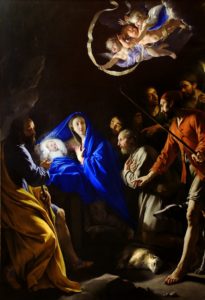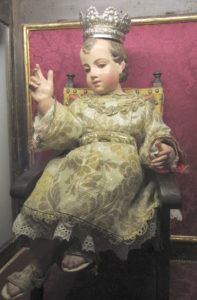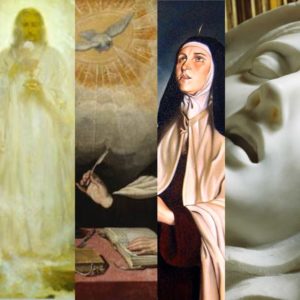
Editor’s note: As a reminder, the Extraordinary Jubilee Year of Mercy ends this Sunday, November 20, 2016
In Manuscript B, Saint Thérèse says that love must descend into nothingness and then be consumed by the fire of Love. She’s totally in touch with the truth of her poverty as a creature, as a sinner in need of God’s mercy, of the Savior. She renounced her merits, she renounced any sense of her perfection; she even renounces the glory of heaven as a reward. She wished to be nothing more than emptiness. She embraced her littleness in such a way that she thought of herself as this depth, this pit in which God could pour out His love according to His good pleasure. She became this openness, this capacity to receive His torrents of love by being in touch with the truth of her poverty.
According to the Spanish contemplative monk who wrote The Little Child of God’s Mercy, “She presents herself to God in the truth of her nothingness with empty hands” – as if she had nothing of her own to offer but her littleness as a child. She had nothing to offer but her dependency, her vulnerability. That is what she had to offer. That is her holocaust. She is the host and that is her holocaust.
“She does not wish to lay up merits for heaven.” Her only aim is to give Jesus pleasure by trusting, by surrendering her poverty, by believing that He who is rich became poor in order to enrich our poverty; by offering herself as a sinner, knowing that He came to call sinners and not the righteous. She prefers to be clothed not with any sense of self-righteousness. Not the name I’ve earned for myself or anything else that I can make for myself. Absolutely not. That’s totally foreign to the little way.
“She prefers to be clothed with Jesus’s own justice,” His merits, “to receive from His love the eternal possession of Himself.” This is where St. Thérèse totally captures the heart of the gospel as being sheer grace, total pure gift – not based on works, but based on Jesus’s work. That’s the heart of the gospel and that is also what we believe as Catholic Christians. Our work is only the working out of our faith in love, but it’s not my work as end in itself or as a way of earning God’s love because my work can never earn God’s love. I could never give God something that would make me worthy of Him. That comes as free gift because of who Jesus is, as His gift to us.
“The eternal possession of Himself is the justice of which she wants to be clothed in– namely Jesus.” For Saint Thérèse, says this Spanish monk, “Holiness was not therefore a matter of perfection of the soul. It did not have to become rich in virtues or be arrayed with gifts of grace in order to become an adult” spiritually speaking. Rather, she had to remain as a child.
What does that mean? She would stay in that state of poignant need in which she could only exist in total dependence on Him, into the very real need of being saved at every moment. Thérèse and so many intimate friends of Jesus, like Saint Catherine of Sienna, have expressed that we’re all called to experience salvation by the free gift of God, not because we’re good enough, but because He is good enough and able to give Himself no matter in what stage we are in our spiritual growth.
God wants all of us to experience that we are loved in an irrepeatable, irreplaceable way. Each of us is uniquely loved by the heart of God, as if we were the only one in the world there is to love. God’s total, undivided attention is on each person, the way that only God can do. Nobody else can do that. That’s not humanly possible. That’s only an attribute, a quality of God as God. And He is able to love that big. The God we adore, the one we believe in is a great God; therefore, He has called us to have great faith, and is able to consume us with love.
Thérèse is the prophet of this great faith in such a great God. In Arabic, for both Christian and Arabs, the word for God is Allah. But the greater name for God is Abba – Father. This is the God whom we worship, the God of tenderness beyond our wildest dreams. The God of Merciful Love, is the God for whom St. Thérèse, the prophet, points.
St. Thérèse ’s Act of Oblation was written under the powerful influence of the Holy Spirit. On Trinity Sunday, during Mass, she felt the Divine life boiling up within her. This offering and prayer is the fruit of that experience. She makes the offering two days after she wrote it, with her sister Celine. Five days after she writes this prayer, she was in the choir about pray The Way of the Cross, and she was seized by a special grace which the mystical doctor, Saint John of the Cross, calls ‘a wound of love.’
She describes, “All of a sudden I was seized by so violent a love for the good God that it was as if somebody had immersed me entirely in fire. Aaah, what fire and what sweetness at one and the same time. I was burning with love and I felt that if it lasted one minute or one second more, I couldn’t have borne this heat without dying.” This is a similar experience as that of Saint Francis, Saint Teresa, and so many other friends of God.
Less than a year later after writing her Oblation, around Holy Week, she entered her own Way of the Cross, her total assimilation to her beloved’s passion. “Throughout the thick darkness of this passive night of the spirit which lasted for the last eighteen months of her life, Thérèse took extreme care to not communicate to others in the community the doubts which assailed her.” According to the bold expression of Saint Paul ‘Him who knew no sin, God has identified with the sin of man for us.’ Jesus became sin and was immersed in it in order to free us from it.
“So too, Thérèse, the redeemer’s bride, entered into this logic. She became sin, [or more exactly, misery] destined to be immersed in the abyss of infinite Mercy. This also meant entering into the greater sharing of Jesus’s redemption; namely, willingly accepting being plunged into the abyss of dereliction and suffering into which her bridegroom was plunged.”
Thérèse definitely had a mission that she was going to accomplish after her life on earth. The preparation for this heavenly mission on earth was this profound experience of the cross as the apex of her conversion and vocation. This profound sharing of the cross was to prepare the way for the harvest which she was to accomplish, that God would accomplish in her, with her, and through her in heaven upon earth. According to some authors, when Saint Thérèse wrote her Oblation to Merciful Love which was around the same time she wrote Mansucript B, she was already in the heights of spiritual life, the seventh mansion. Her Oblation to Merciful Love was on June 9, 1895 and she begins Manuscript B on September 8, 1896, over a year later. She dies just a year over that.
When she writes Manuscript B, she is already in her dark night of the soul. She had already begun her spiritual and physical sufferings, the hemorrhages and temptations against faith. In Manuscript B, the masterpiece of all her writing, she talks about her vocation of love as Heaven’s child, like a little eagle on the wings of the Divine eagle. She has the prophetic insight into her mission to ask to receive a double portion of all the saints, that she may gather a legion of little souls worthy of Infinite love.
To conclude with the words of Saint Thérèse, at the end of Manuscript A, “Love penetrates and surrounds me. Each moment, this merciful love renews me. What I am certain about is that God’s mercy will accompany me always.” And as she says in her Act of Oblation to Merciful Love, “Oh my God, since you loved me so much as to give me your only Son as my Savior and my Spouse, the infinite treasures of His merits are mine. Look upon me only in the face of Jesus and in His Heart burning with love.” END
Saint Thérèse and all Carmelite saints, pray for us.
(SOURCE: San Rafael, CA Novena, September 2016) Thérèse 7- transcribed by TL
Copyright 2016, Fr. Robert Barcelos. All Rights Reserved
‘Arm yourselves with the armor of faith and the sword of truth. Pray for the grace to forgive and to ask for forgiveness – and for the healing of wounded bodies and souls.’
[sbscrbr_form]








